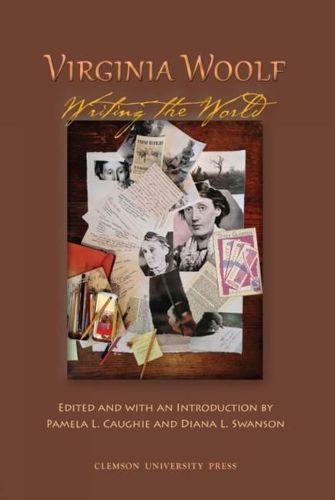Readings Newsletter
Become a Readings Member to make your shopping experience even easier.
Sign in or sign up for free!
You’re not far away from qualifying for FREE standard shipping within Australia
You’ve qualified for FREE standard shipping within Australia
The cart is loading…






Woolf Writing the World addresses such themes as the creation of worlds through literary writing, Woolf’s reception as a world writer, world wars and the centenary of the First World War, and natural worlds in Woolf’s writings. The selected papers represent the major themes of the conference as well as a diverse range of contributors from around the world and from different positions in and outside the university. The contents include familiar voices from past conferences–e.g., Judith Allen, Eleanor McNees, Elisa Kay Sparks–and well-known scholars who have contributed less frequently, if at all, to past Selected Papers–e.g., Susan Stanford Friedman, Steven Putzel, Michael Tratner–as well as new voices of younger scholars, students, and independent scholars. The volume is divided into four themed sections. The first and longest section, War and Peace, is framed by Mark Hussey’s keynote roundtable, War and Violence, and Maud Ellmann’s keynote address, Death in the Air: Virginia Woolf and Sylvia Townsend Warner in World War II. The second section, World Writer(s), includes papers that read the Woolfs in a global context. The papers in Animal and Natural Worlds bring recent developments in ecocriticism and post-humanist studies to analysis of Woolf’s writing of human and nonhuman worlds. Finally, Writing and Worldmaking addresses various aspects of genre, style, and composition. Madelyn Detloff’s closing essay, The Precarity of ‘Civilization’ in Woolf’s Creative Worldmaking, brings us back to international and cultural conflicts in our own day, reminding us, as Detloff says, why Woolf still matters today.
$9.00 standard shipping within Australia
FREE standard shipping within Australia for orders over $100.00
Express & International shipping calculated at checkout
Woolf Writing the World addresses such themes as the creation of worlds through literary writing, Woolf’s reception as a world writer, world wars and the centenary of the First World War, and natural worlds in Woolf’s writings. The selected papers represent the major themes of the conference as well as a diverse range of contributors from around the world and from different positions in and outside the university. The contents include familiar voices from past conferences–e.g., Judith Allen, Eleanor McNees, Elisa Kay Sparks–and well-known scholars who have contributed less frequently, if at all, to past Selected Papers–e.g., Susan Stanford Friedman, Steven Putzel, Michael Tratner–as well as new voices of younger scholars, students, and independent scholars. The volume is divided into four themed sections. The first and longest section, War and Peace, is framed by Mark Hussey’s keynote roundtable, War and Violence, and Maud Ellmann’s keynote address, Death in the Air: Virginia Woolf and Sylvia Townsend Warner in World War II. The second section, World Writer(s), includes papers that read the Woolfs in a global context. The papers in Animal and Natural Worlds bring recent developments in ecocriticism and post-humanist studies to analysis of Woolf’s writing of human and nonhuman worlds. Finally, Writing and Worldmaking addresses various aspects of genre, style, and composition. Madelyn Detloff’s closing essay, The Precarity of ‘Civilization’ in Woolf’s Creative Worldmaking, brings us back to international and cultural conflicts in our own day, reminding us, as Detloff says, why Woolf still matters today.